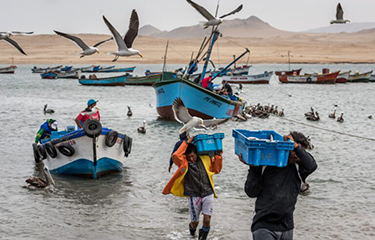Por la Pesca, a joint project established in 2022 between the Walton Family Foundation and the U.S. Agency for International Development (USAID), is on a mission to decrease illegal, unreported, and unregulated (IUU) fishing in Ecuador and Peru.
Por la Pesca has set a goal of decreasing IUU fishing in the two South American nations – an issue that has risen in prevalence and profile in South America – by up to 30 percent over the next five years. To do so, it has launched a campaign to encourage artisanal fishers to become licensed and registered by reducing barriers to formalization such as high costs, lack of application information, and lengthy waiting periods. The organization’s project also features a plan to create new fisher associations, with the aim of increasing the bargaining power of local fishers.
“Licensed fishers are more likely to comply with regulations, and the authorities can monitor and enforce them effectively. Not only does this help prevent the depletion of fish stocks, but also, it creates a level playing field for all fishers, drastically reducing any possible incentives for corruption,” Walton Family Foundation Environment Program Officer Renu Mittal said.
In five years, Por la Pesca intends to complete licensing and registration for 1,000 artisanal vessel owners, benefiting at least 6,000 fishers in the mahi, jumbo flying squid, octopus, and tuna fisheries in both countries. Within the same time frame, the project plans to support at least 20 artisanal fisher associations to improve their bargaining power regarding catches and foster collaboration with governments to set better parameters around the industry.
The effort is designed to undermine the market for IUU-originated seafood, as unregistered fishing vessels cannot gain access to export markets or advocate for fishery management due to an inability to meet international sustainability standards, Mittal said. Simultaneously, attaining governmental licensing and registration enables fishers to gain fishing rights and operate in a formal economy, and commits them to adhering to conservation-focused rules and regulations.
“The main goal is to provide market and regulatory incentives to fishers to formalize and increase responsible practices,” Mittal said.
Highly migratory stocks such as mahi, jumbo squid, and tuna require greater management due to the nature of their movement across boundaries, Mittal said. International formalization and registration ensure sustainability of these stocks through defined limits, improved working conditions, and management strategies. According to Mittal, Por la Pesca’s work is an example other countries can follow to improve the participation, reporting, and compliance of domestic fisheries with international management systems, especially in regard to fisheries that straddle or cross jurisdictional boundaries.
For near-shore fisheries like octopus, Por la Pesca’s work toward formalization and capacity-building for co-management structures is “critical,” according to Mittal. It also has secondary benefits …
Photo courtesy of Oceana








